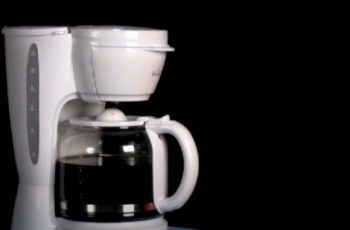Maintaining a clean Bunn coffee maker goes beyond just keeping its exterior shiny. Internally, mineral deposits frequently amass in the spray head tube and water reservoir. Fortunately, Bunn provides a unique tool designed to clear these blockages in the spray head. Below are several techniques for thoroughly descaling a Bunn coffee maker.
Ways To Descale a Bunn Coffee Maker
This descaling process will help you to remove mineral and hard water deposits found inside the coffee maker. The procedure should be performed at least once a week, particularly if you use hard water. Here are the proper steps you need to take to completely descale your Bunn coffee maker:
Step 1: Prepare The Vinegar And Distilled Water Mixture
Pour distilled water and vinegar into a coffee maker and fill it up. The mixture should be split into ⅓ vinegar and ⅔ distilled water. For example, pour 8 cups of water and 4 cups of vinegar into a 12-cup reservoir.
Step 2: Set Up a Brewing Cycle
To start a brewing cycle pour the descaling mixture into the water reservoir. This mixture will help remove calcium and mineral deposits inside the coffee maker.
Step 3: Remove And Dispose Of The Brewed Cleaner
Once your brewed descaling mixture is filled up in the coffee pot, remove all of it.
Step 4: Wash The Spray Head And Its Fittings
Turn off the coffee maker and unplug it. After removing the spray head and open fittings, you can use the spray head cleaning tool to remove deposits from them. With the tool’s long head, clean the spray head and bypass fittings.
Step 5: Use Fresh Water For Rinse Cycles
Install the spray head again and plug in the coffee maker. Turn on the coffee maker and pour distilled water into the reservoir once it’s been turned on. To remove any unwanted flavour left by the descaling solution, start a second brewing cycle. You may need to repeat this until the odors disappear.
How To Make Descaling Solution At Home
There are a number of descaling products that contain chemicals that are acidic and strong enough to remove mineral deposits from a coffee maker. Descaling can still be done with common household items too. A DIY descaling solution will save you money as well as allow you to control what goes inside your coffee maker. Descales made from natural ingredients have similar effects to commercial ones.
Vinegar
A good, inexpensive cleaning product you can make at home is vinegar. It is capable of cleaning as well as sanitizing. Due to vinegar’s high acidity, it is excellent at removing minerals. It is also cheap and easily available. It may take a few cycles for all the calcium and other minerals to be removed from the coffee maker.
Make a solution by mixing ⅓ vinegar with ⅔ water.
Lemon juice
One of the most effective ways to descale a coffee maker is with lemon juice. Lemon juice is all-natural despite being acidic, so you won’t have to worry about it destroying your coffee maker. The coffee maker needs to be rinsed with water to eliminate the taste of lemon.
Make a solution by mixing ⅓ lemon juice and ⅔ water.
Baking soda
Baking soda can help remove mineral deposits and stains from coffee makers. It works better for cleaning than descaling. It may take multiple runs of this solution to thoroughly descale your coffee maker. After using baking soda on your coffee maker, it will shine cleaner and won’t leave a scent or taste behind.
Make a solution by adding a teaspoon of baking soda to about a liter of warm water until it becomes homogeneous.
Citric acid
Citric acid has a relatively low pH which makes it a great mineral remover. This smells nice, and it washes off with ease. This makes citrus acid perfect for descaling. It is usual to smell and taste chemicals after using cleaning solutions. Citric acid does not leave this residue. You will likely have to do more cycles to achieve the same results because it’s less acidic than store-bought cleaners and vinegar.
Make a solution by adding a tablespoon of citric acid pellets to a gallon of water.
Conclusion
Trust your taste buds to hint when you should clean your coffee maker. By cleaning your Bunn coffee maker regularly, you will ensure that every cup of coffee you make tastes delicious. Take good care of your coffee maker to prevent contaminants such as bacteria and minerals from building up and to ensure it serves you well.
Although you can use many different brands of chemicals, we suggest trying to clean your coffee maker using the natural techniques listed above first. We hope you find our article useful on how to clean and descale your Bunn coffee maker.


